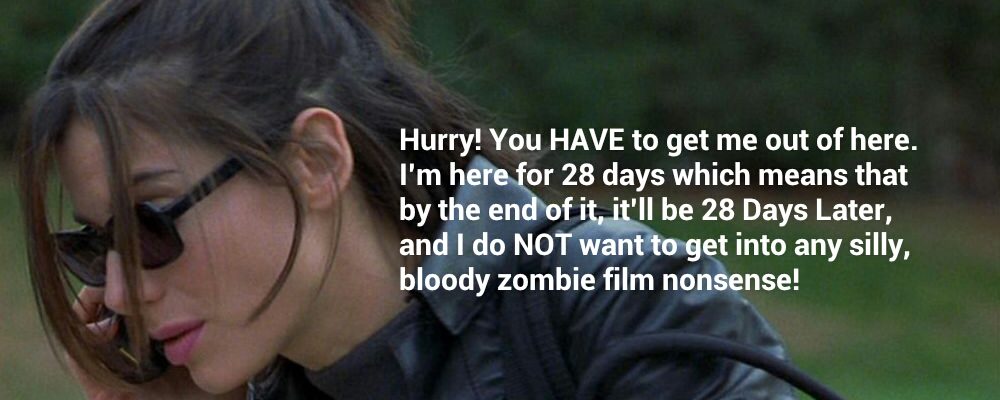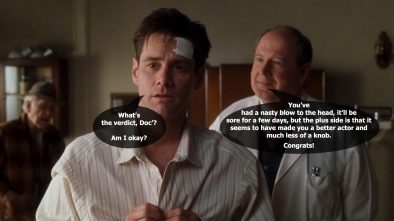Moderation in Excess
A look at the film ’28 Days’ directed by Betty Thomas.
I think it’s within our nature, as human beings, to find ways of messing ourselves up in horrible ways and then pretend like we enjoy it.
I can’t think of a single other instance where another species creates or partakes in the ingestion, injection or inhalation of unusual substances in order to make them feel a little better about themselves.
The only example I can come close to is cats with their catnip, but even that is something usually only possible because we humans have made sure to sprinkle some down for the cat so we can watch it go all googly-eyed and soggy-brained for an hour while it licks the carpet and tries to walk on its head.
My drug of choice is chocolate. It tastes good, has a variety of ways it can come and makes me feel a little bit of comfort. it might stop me rediscovering my long-forgotten waistline but aside from that, it doesn’t have any other impairment, leaving me clear headed and coherent to function for day-to-day activities and without producing carcinogenic fumes that will affect to anybody around me.
But there are many who decide that something harder is required. Father Roy was one of them and after several years of battling an alcohol addiction with a few brief spells of drying out and trying to live normally, it finally beat him and he died as a result.
He may have thought his drinking to excess only mattered to him, that it had no further reach. Maybe he had forgotten what it was like trying to talk to someone who was drunk. The awful nonsensical slurring, that evil vodka-breath that could melt through titanium and that awful feeling you get that you’ll be obliged to help if they pass-out while you’re there with them.
And when liver failure inevitably does occur, they leave behind a devastated family who know they all did everything they could to help, but because it wasn’t enough, leaves us feeling like maybe we could have tried harder.
As with any person who has/had an addiction or dependency on a drug or substance, Father Roy was the only person who could have any direct influence on his choices. He had to want to stay off the drink to get better, even when the alternatives were so damaging.
These are themes that were explored back at the turn of the century when Betty Thomas directed a screenplay called ’28 Days’. Not many people know about this film and it’s easy to see why. 2000 was a good year for cinema with a great many very successful pictures being released; ‘Cast Away’, ‘Requiem for a Dream’, ‘Unbreakable’ and ‘Gladiator’ to name just a tiny few of the great many that got people talking.
So a quirky little film by a director who, despite having a handful of relatively well known and/or reasonable projects under her belt, has never become a household name like Fincher, Spielberg, or Aronofsky have done, just was never going to really impact the world on the scale that it’s makers probably hoed it would.
And not just from a financial perspective. The messages contained there-in are also pertinent and relevant to our modern lives.
Sandra Bullock and Dominic West start the film as a fun-loving couple who drink themselves daft and then have an awesome time with their like-minded friends. They have their chaotic lives and that’s how they like it. But when Bullock goes a bit mental and makes a scene at her sister’s wedding, culminating in the theft and predictable crashing of the brides limo’, a 28 day (hence film title) stint in rehab ensues
The opening of the film is a little skittish with pacing that seems all over the place, shots that seem a bit shonky and editing that creates a sort of frenetic slap-dash look. I personally wasn’t too bothered but I know some who found it a bit off-putting. The erratic camera shake and poor focus does eventually settle. It’s a slow, subtle process but coincides very nicely with the sobering up of Bullock’s character while undergoing treatment.
The interactions among the patients at the rehab clinic are believable and the various characters, while a little by-the-numbers, all have their place to help the film and their own personal development just fine.
The script won’t set your world on fire. There are good moments and cheesy moments, predictable moments and a lot of fairly typical stuff, but nothing so razor sharp that you’ll be quoting it for weeks afterward. Despite this, it’s got the right tone, aimed somewhere between very lightly amusing and wanting to be seriously informative and will keep you sufficiently engaged for the duration.
An this appears to the the mantra for pretty much everything about the film; good but nothing special. The soundtrack for the film is generic and totally invisible but does just enough when it needs to and the acting is good but nothing to deserve and award of any kind.
The real power of this film lies in its ability to open our eyes to the damaging nature of addictions and other destructive behaviours. It shows the best and the worst of scenarios; those who overcome their problems, those who have to keep trying to overcome their problems and those who are completely destroyed by their problems.
It manages to make you smile warmly when things are going well for people and shed a tear out of the frustration of seeing people acting so irresponsibly. For those of you who have watched someone you care about go through a substance problem, this will hit home on many levels. For those of you who have not yet had to endure such a thing, this will either be a quirky little film you can tolerate for a hundred minutes or it will be a little peek through a window you hope never to have to live with.
It’s not preachy or obnoxious. This is possibly the most important thing I can stress about this film. While the message is very clear; “drugs and drink are bad”, it doesn’t go about stuffing it down your throat like propaganda, leaving just enough wiggle room to leave the “be responsible” thought to squeeze by.
That said, it’s not going to appeal to many, simply because as stories go, it’s not really complex or original. The protagonist-sees-error-of-ways-and-overcomes-adversity-to-reform has been done a million times before and often with greater cinematic appeal.
If you just happen across it one day and it’s on a TV channel you can access or going for £1.50 at a boot-sale, pick it up and give it a little time. At the very least, you get an hour and a half of the gorgeous Sandra Bullock being very much like Sandra Bullock which is never a bad thing. Unless you really want to see something about addictions, there’s not much to go chasing for.
Perhaps this was the point? A film with no lasting consequences or side-effects. A simple, uncomplicated bit of relief that make you feel something for a short time until you move on to your next fix, whatever or whenever that may be.
Watch responsibly!
A reason why you should watch it: Might help you to understand the destructive cycles people can get themselves into without realising and offers a glimpse at a possibility of there being a way out of them. Can also be used a gentle warning to others you see going down those slippery slopes into addiction.
A reason why you shouldn’t watch it: Because you’ve either lived it or lived with it and just can’t bear to go through it all again




Another well-written revue.